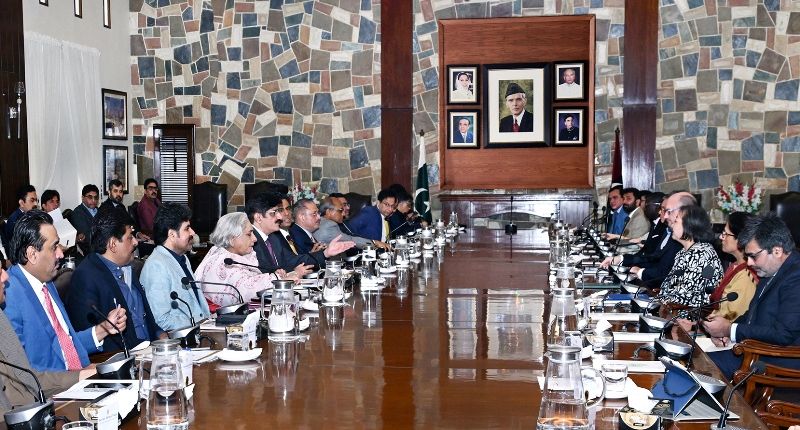KARACHI : Sindh Chief Minister Syed Murad Ali Shah, along with his team, held two separate extensive meetings with a World Bank delegation led by Country Director Ms Bolormaa Amgaabazar – the first meeting focused on critical fiscal reforms aimed at strengthening revenue generation and service delivery mechanisms essential for fostering long-term economic growth and the second meeting reviewed the progress of the World Bank’s ongoing projects.. The discussions highlighted the urgent need for strong mechanisms to implement the commitments under the fiscal pact. The meeting, held at CM House, was attended by Sharjeel Memon, Dr Azra Fazal, Nasir Shah, Sardar Shah, Jam Khan Shoro, Mohammad Ali Malkani, Chairman P&D Najam Shah, Secretary Finance Fayaz Jatoi and others. The World Bank delegation includes Operations Manager Draugelis, Operations Officer Hina Salim, Development Specialist Kamran Akbar and others. During the first meeting, it was agreed that the slow progress in human development needed to be improved. It was agreed to work together towards finding solutions and making things better. The strategies discussed included strengthening revenue mobilisation, enhancing provincial revenue through Agriculture Income Tax, Sales Tax on Services, and Property Taxes. Improving Expenditure Quality: It was discussed and agreed to focus on quality education and health expenditures, alongside pension reforms, which the provincial government has already introduced, and the digitisation of government payment processes. Enhancing the Data Ecosystem: It was agreed to reform the Sindh Bureau of Statistics to better track fiscal and service delivery outcomes, integrating administrative and survey data, and improving tax forecasting methods. The chief minister said that he has initiated, Sindh Public Resources for Inclusive Development (PRID) structure, which aims at bolstering provincial own-source revenue, rolling out comprehensive pension reforms, and ensuring timely allocation of budgets for schools, ultimately seeking to create a robust statistical landscape conducive to evidence-based policymaking. The initiative aims to enhance the collection of Agriculture Income Tax and further year-on-year collection in Sindh Sales Tax. Furthermore, government vendor payments are anticipated to transition to digital formats, ensuring a more efficient financial ecosystem, the CM said. The Government of Sindh remains committed to improving the quality of service delivery and fostering an environment of transparency and accountability as it navigates these significant reforms.














